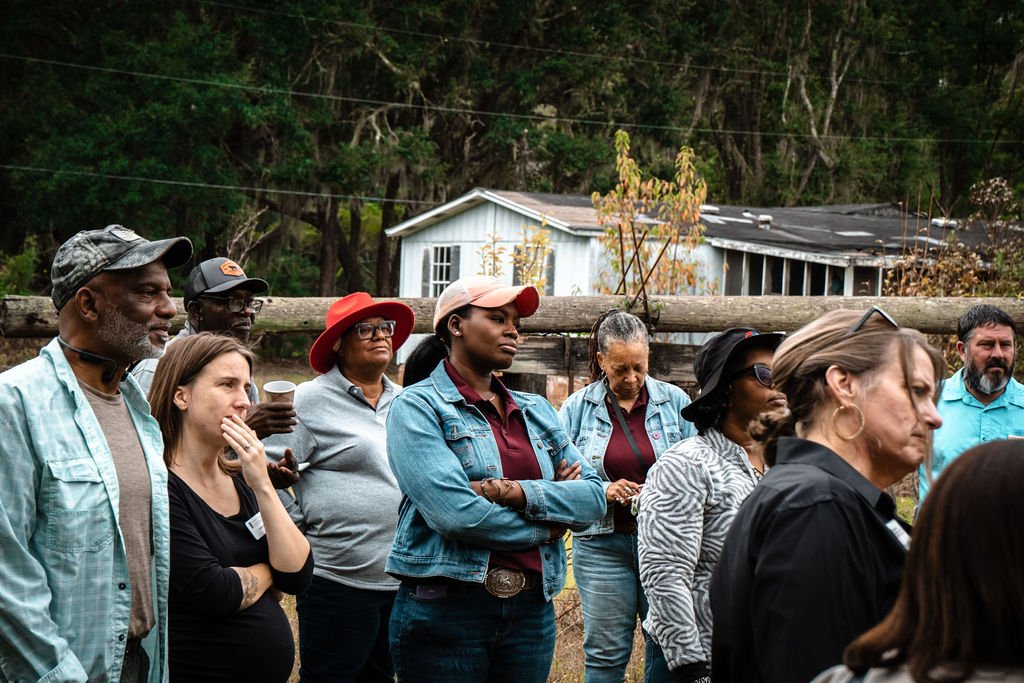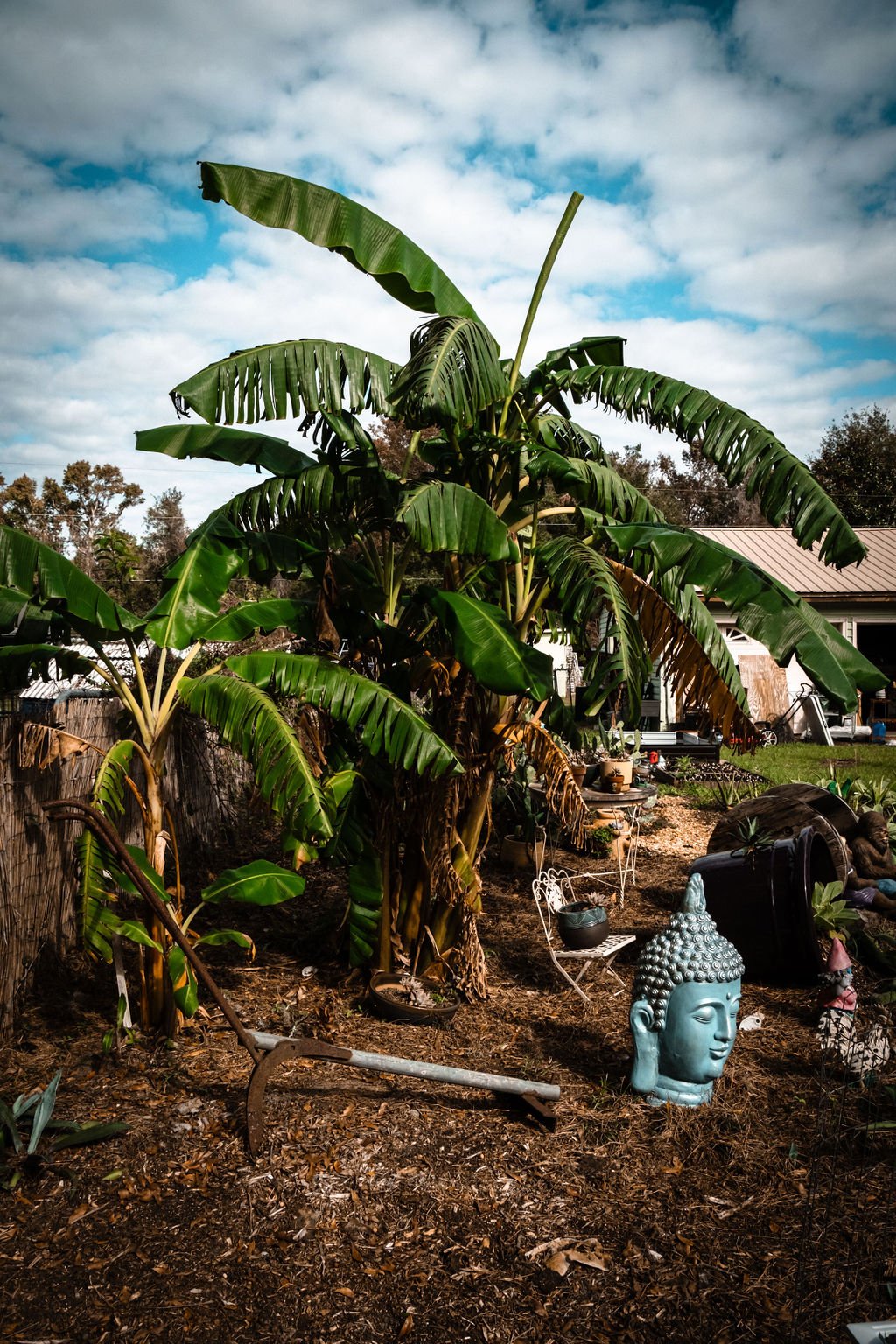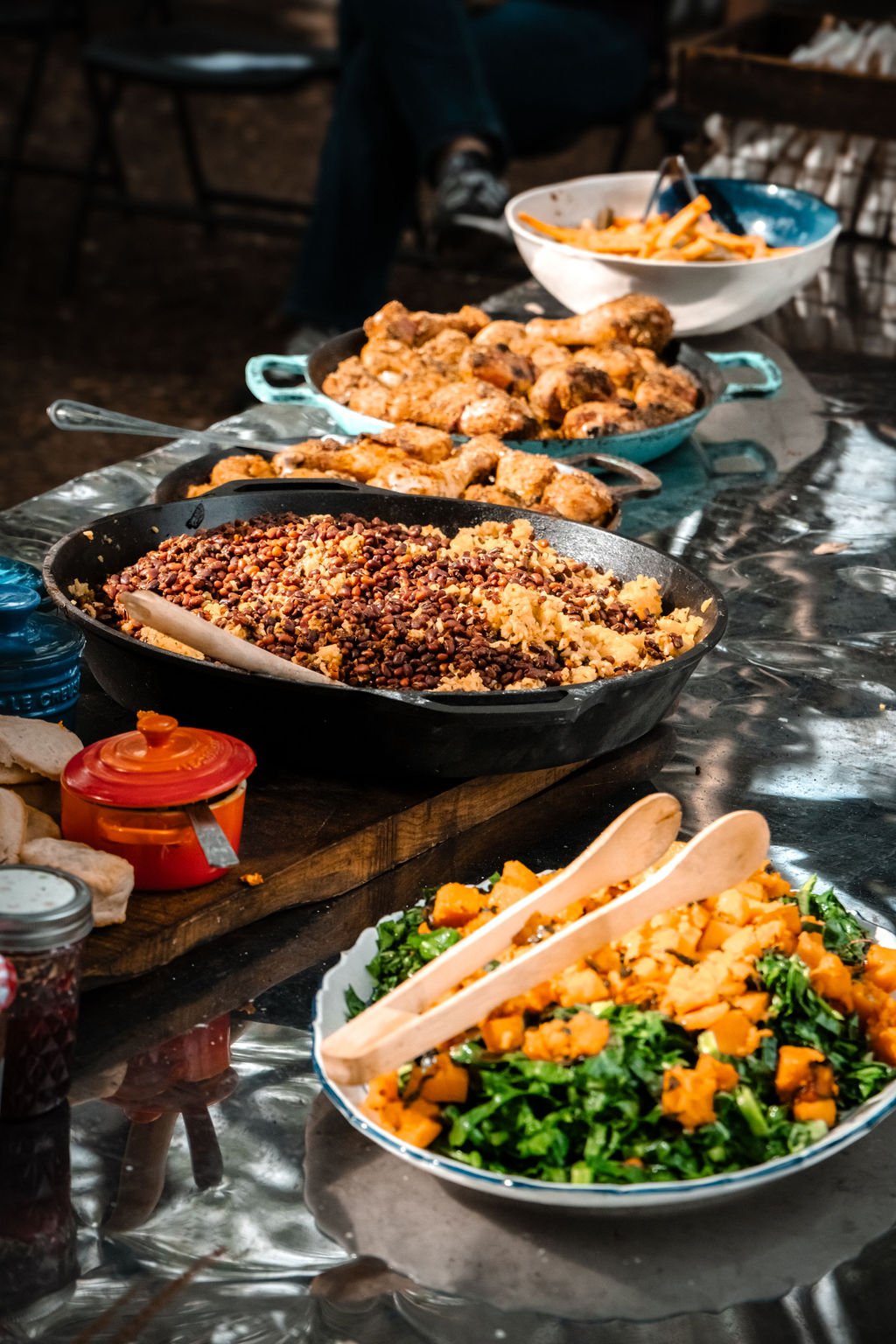By Lauren Cox
Lauren Cox is the Director of Farmer Services at Georgia Organics
Attendees arriving to Love is Love Cooperative Farm.
On February 26, 2024, Georgia Organics and the Georgia ACRE Collective hosted a Farmer Field Day at Love is Love Cooperative Farm in Mansfield, GA, in partnership with The Common Market Southeast and The Conservation Fund. The event focused on post-harvest processing, food safety, and scaling for wholesale markets. Attendees toured the farm to see harvest, wash, and pack processes designed for diversified revenue streams. Rahul Anand of Snapfinger Farm shared efficient post-harvest practices and Bill Green (Common Market Southeast) offered key insights on food safety and requirements for selling to institutions like schools and hospitals.
Love is Love Farm Business Set Up
Love is Love Cooperative Farm was the perfect backdrop for a farmer field day focused on wholesale markets given the farm’s unique structure and growth since it transitioned to a worker/owner cooperative model in 2021. Prior to 2021, Joe Reynolds ran Love is Love Farm on a farm site in East Lake Commons (Gaia Gardens) with a fairly small footprint (5ish acres) catering to a devout 160 member CSA and a handful of local restaurants. Now, sitting on 70 acres in Mansfield, GA, with four additional owners in Judith Winfrey, Demetrius Milling, Monica Ponce, and Russell Hondard, the farm identity in its newest iteration is focused on wholesale and larger numbers of retail customers.
It was important from the start for the group to have identified their markets, or at least the markets they wanted to access, and their business plan reflected that. The model was based on splitting 50% of sales on diversified crops going direct to consumers with the other 50% going to large crops in wholesale markets. With 6 acres in production, 6 high tunnels, and $6,000 in greenhouse space, there was plenty of room to grow both markets. The biggest considerations involved setting up the farm layout and systems to support both their new wholesale and larger retail markets.
As a cooperative farm (and C-corp) there is equal ownership of the farm with 1 member getting 1 vote on any decision that needs to be made using a consensus model. Although this means things moved slower, the benefit has been getting collective buy-in and quick movement after collective decisions are made.
The owners also have weekly business meetings and are technically the board of the business. Joe Reynolds and Demetrius Milling manage all the fieldwork while Russell Honderd heads up the wash/pack area and Monica Ponce handles flowers and all things “greenhouse”. Judith Winfrey handles communications, sales, and marketing along with grant management as needed.
A large greenhouse where seeding happens weekly allows for a continuous harvest in the field. A hose hanging on an overhead skid makes watering such a large greenhouse easier by avoiding dragging the hose on the ground.
Looking back on starting up the farm in its current iteration, one of the owner's commented, “There was what we “wanted to do” versus “what we did” but all in all, we pretty much knew what the plan was.” Joe Reynolds
Accessing Land, Focused on Growing
Accessing land is often the biggest challenge for farmers looking to scale up, and it was the same for Love is Love prior to 2021. Enter the Working Farms Fund, a program within the Conservation Fund that secures farmland on the edge of major metro areas and matches it to farmers who lease, steward, and then eventually buy the land from the Working Farms Fund once it’s under an agricultural conservation easement. Basically, the program works to create a lease to own contract coupled with putting land into a conservation easement that drops the market value by 50% thereby making it accessible to farmers for purchase. The Love is Love crew connected with The Working Farms Fund and were able to finance the purchase of the farm through this program like 10 other farmers in Georgia who also leased to own under the program. Krisztian Varsa, Director of the Working Farms Fund recommends farmers connect with Potlikker Capital and Foodshed Capital, both organizations that help finance land as well as business purchases for farms looking to scale up.
Diverse growing space across the farm allows for growing things for different customers. This varies across fruits, vegetables, perennial, and annual crops as well as harvest periods.
Considering Wholesale Markets
Throughout the Farmer Field Day and farm tour, the speakers weaved in considerations and thoughts about scaling up. One of those themes was that wholesaling can encompass a lot. Sometimes even packaging for retail is involved (for example, if a product is sold to a grocery store whose ultimate customer is a retail customer, a farm would sell something at wholesale cost but be required to package the product for retail). Wholesale markets also include dining halls and institutions like hospitals and schools. Bill Green, from Common Market Southeast, told attendees at the Farmer Field Day that he sees a trend in “commitments” to purchasing locally and values-based procurement. “Wholesale customers want what every other customer wants”, Bill explained, “quality, consistency, dependability, and a good price but they’re also moving towards spending money that align with their values” He also mentioned that GAP certification is often required when supplying food for vulnerable populations like children or seniors but said that farmers should decide first if they want to break into wholesale before getting GAP certified.
Field Space Allocation and Efficient Implements
Another topic covered during the Field Day was farm layout, which is tantamount to a well-functioning and efficient farm system. With wholesale purchasing in mind and the growing scale it requires, the owners of Love is Love envisioned from the onset a highly mechanized operation. That meant less passes with a tractor or on foot, season extension infrastructure like high tunnels, and planting produce that requires minimal processing like storage crops that could be sold in bulk during the slower winter months. The high tunnels hold herbs, cut flowers, Asian mix, and early spring stuff. The open fields are where the larger main season crops grow, including brassicas (cabbage, broccoli, cauliflower, etc) and things that are highly desirable in retail (like tomatoes).
Joe Reynolds showing Farmer Field Day attendees a mechanized cultivator implement for a tractor
As current as the Farmer Field Day, Love is Love is still beta testing which crops work best for wholesale markets as they continue to navigate a yearly footprint expansion and putting more acreage into production. In that sense, they expect their crop rotation to shift a bit every year based on what works, what sells, and how much land they are growing on. Case in point, in 2021 they started on 2 acres which increased to 6 acres in 2022 then in 2023 moved up to 6 acres in production at their main site and 2 acres on other properties near the farm.
Figs, asparagus, muscadines, and berries were incorporated into the spaces for perennial production. These add value to their CSA shares and fill a niche market for smaller restaurant customers but are not for their wholesale customers. To grow these items for wholesale, Love is Love would have to invest in highly specialized equipment. Instead, they decided to invest in other efficient on-farm equipment like a no-till seed drill, a water wheel transplanter, and a small tractor used for mechanized cultivation. Currently, Love is Love now grows 60% for CSA markets (400 families during the main season), 20% wholesale (or pallet-scale) to Fresh Harvest and Common Market, and the rest goes to restaurants.
Rahul Anand, from Snapfinger Farm, mentioned that the ability to project yields is very important for wholesaling, especially since many wholesale customer accounts are based on contracts for the season. He recommended thinking about and discussing the pack size, bunch count, pricing, and # of weeks of availability with the wholesale customer before you even put something in the ground. It goes without saying, this also means that you should consider what you want your workforce to look like and think about the rhythm of the season as it pertains to the labor needed to get a product from door to door. Example: having a contract for 200lbs. of tomatoes every week for two months in the summer means you’re obligated to have the labor force to pick and deliver each week.
What other items do you need to deliver, and is there enough room in your delivery vehicle, or will you have to take another trip?
Is there anything else that you could fill the van with for that same customer, saving you a trip and making more sales?
Asking yourself things like that will help shore up potential gains in the field along with inefficiency once things are harvested. Bill Green from Common Market Southeast recommends always being a little conservative with your estimates until you get a good handle on production.
Attendees of the Farmer Field Day discussing wash pack station layout
Wholesale Considerations as It Relates to Farm Systems
Most of the money spent at Love is Love goes to labor and packaging. Because packaging and the costs associated with it are hard to adjust or change, labor then becomes the focal point of cutting costs. The main way to cut labor, all the Love is Love owners agreed, was in diminished “touches” and reducing “steps” or “passes” between getting a plant harvested, out of the field, packaged, and into a cooler. Thinking about putting wheels on everything you can saves your back but also moves things along quicker and its not necessary to have a huge processing facility, just one that is efficient and has good ‘flow’.
Attendees were reminded that they should be somewhat flexible around the processing process for items that come into the wash-pack building, especially if they’re straddling both a wholesale and retail market. Love is Love worked with the University of Vermont Extension office to build their wash-pack building aimed at maintaining a clean and efficient space. The walk-in cooler door size was a huge consideration since letting cold air out is energy inefficient but being able to put pallets through a door saves a lot of time for wholesale post-harvest handling. Using a Coolbot system and going to a used cooler dealer in Cartersville, GA helped save on the initial set up. They also invested $16,000 in an AZS Rinse Conveyer which seems like a lot of money but it has the ability to wash bins in addition to root vegetables and other hearty produce that needs to be washed. The post-harvest items that have been the most time saving are:
Speed Queen, augmented clothes washer (for salad and loose-leaf greens)
AZS Rinse Conveyer (for roots and bins)
Barrel Washer (for topped root vegetables)
Wheels on tables and placing bins on carts that can roll directly into the cooler
Wheels are vital in making processing easier from field to cooler
Rahul Anand, from Snapfinger Farm, also spoke about his wholesale packing house. Snapfinger Farm has gone full-on wholesale bringing pallets into the field carried by tractors and packing items like bunched collards and kale and heads of cabbage directly into boxes and driving them into the coolers. “There are some things that actually don’t need to be washed for wholesale”, Rahul notes. Rahul suggested doing what he did to source his larger walk-in coolers.... looking online to see if any grocery stores were closing down. He bought his coolers from a Kroger that was going out of business but uses a Coolbot, like Love is Love, to cool the space.
Where to Start
All the speakers for the field day shared advice on breaking into wholesale. Joe Reynolds suggested talking to folks you want to sell to first and gradually building the relationship. Rahul emphasized the need for plans. “Have them! And find capital because you’ll need to count on scaling at some point to meet the demand. Also decide on the horizon time for where you ‘want to be’.” Krisztian Varsa emphasized the need to budget and keep good records no matter how big or small your farm is. Financial records are equally important in the mix. And Bill Green seconded Joe’s advice adding that wholesale markets aren’t for everyone but that there is a market of people out there buying wholesale that are ready and committed to supporting local farms if a farmer is seriously interested in going into wholesale.
This field day was part of the Farmer Services 2024 Winter Farmer Series. This series was created to ensure that farmers were still able to access valuable resources and continuing education opportunities during the slower winter season in lieu of a 2024 Georgia Organics conference.
Thank you to Love is Love Cooperative Farm for your hospitality, insights, and valuable time on this awesome field day!
To learn more about Love is Love Cooperative Farm, visit https://www.loveislovefarm.com/
To learn more about The Common Market Southeast, visit https://www.thecommonmarket.org/locations/the-common-market-georgia
To learn more about The Working Farms Fund, visit https://www.conservationfund.org/focus-areas/working-lands/working-farms/
To learn more about Georgia Organics visit georgiaorganics.org or follow us on Facebook, Instagram, X, LinkedIn, and YouTube.
To learn more about our Georgia Organics Farmer Services programming, check out our website farmerservices.georgiaorganics.org.
Want to keep up to date on future farmer-focused events, farmer resources, updates, and news? Join our monthly e-newsletter, the Grower News, for all the latest! Sign-up HERE.
This work is supported by the BFRD program from the USDA National Institute of Food and Agriculture and the ACRE Collective. Any opinions, findings, conclusions, or recommendations expressed in this publication are those of the author(s) and do not necessarily reflect the view of the U.S. Department of Agriculture

















































